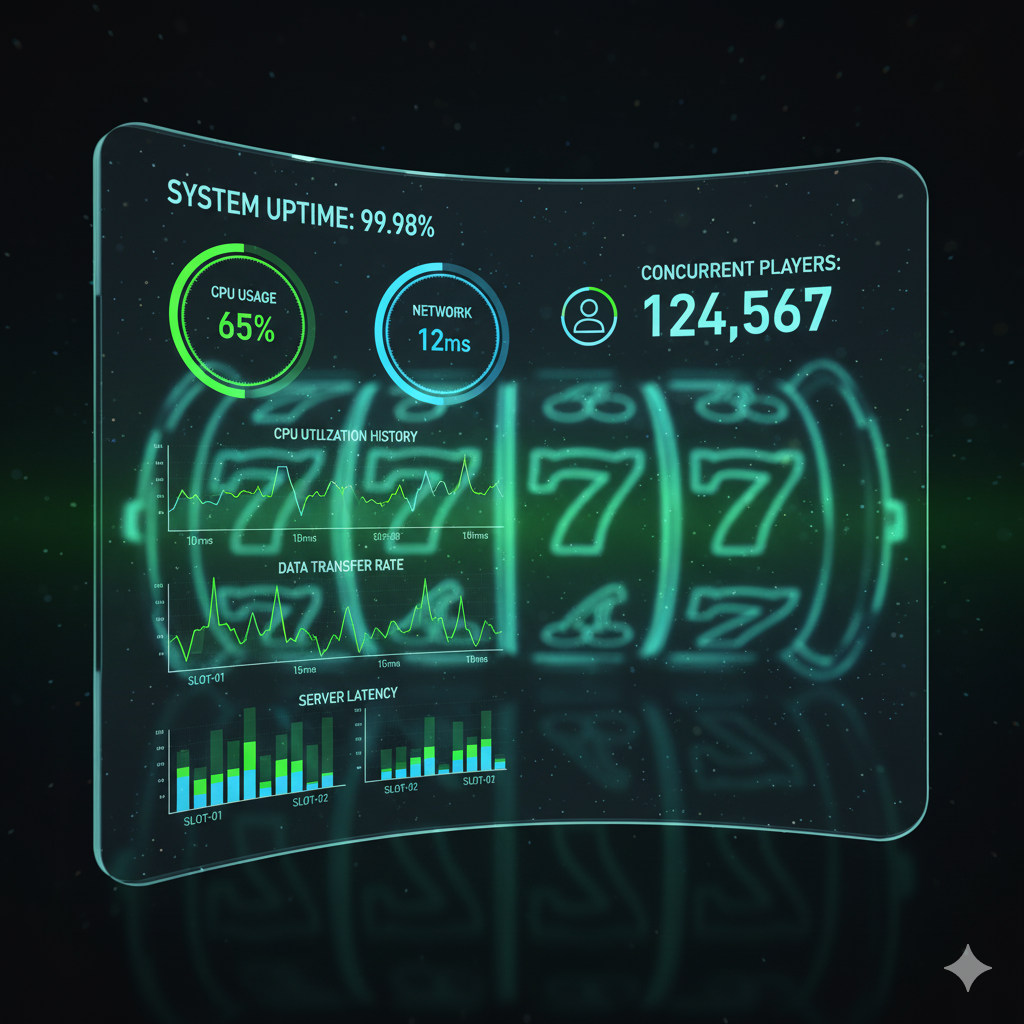Here’s a fact that might surprise you: slot games make up about 85% of all money that online casinos earn. That’s huge. When players log in to spin the reels, they expect everything to work perfectly—no lag, no crashes, no waiting.
As your casino grows and more people play at the same time, your servers need to handle the extra load. If your slot games server igaming setup can’t keep up, players get frustrated and leave. That means lost money and a damaged reputation.
Good igaming server hosting needs to grow when things get busy and use fewer resources when things are quiet. This is called scalability, and it’s absolutely critical for online casinos. Whether you’re running a casino in the US, Canada, Europe, or Australia, you need hosting that can handle anything from 50 players to 50,000 players without problems.
In this guide, we’ll walk through the best hosting options for slot game servers. We’ll keep things simple, compare costs, and help you figure out which solution fits your needs.
Three Types of Hosting for Slot Games

Let’s break down your hosting options without all the technical jargon.
Dedicated Hosting: Your Own Physical Server
Dedicated hosting means you rent an entire physical server. No other companies or casinos share that machine with you. Your casino slot software and virtual slot machines run on hardware that’s completely yours.
Benefits:
- Very fast performance and reliable uptime
- Maximum security for your casino operations
- Full control over server configuration and remote slot configuration
- No competition for resources from other users
Drawbacks:
- Expensive, typically $200-$800+ per month
- Cannot instantly scale up during traffic spikes
- Requires technical knowledge to manage and maintain
- You pay the same price whether you use 20% or 100% of capacity
Best for: Established casinos with thousands of regular players and consistent traffic patterns.
VPS Hosting: Virtual Private Server
VPS hosting divides one physical server into multiple virtual servers. You get a dedicated portion of the server’s resources (CPU, RAM, storage) but don’t pay for the entire machine. Your online casino VPS runs independently from other virtual servers on the same hardware.
Benefits:
- Much more affordable, typically $50-$300 per month
- Dedicated resources for your slot game backend
- Can handle medium-sized casinos effectively
- Easier to upgrade when you need more capacity
- Better than shared hosting for gambling site scalability
Drawbacks:
- If the physical server fails, all VPS instances are affected
- Slightly less powerful than dedicated servers
- Still needs some technical management
- Resource limits can be reached during unexpected traffic surges
Best for: Growing casinos that need reliable performance without high costs.
Cloud Hosting: Distributed Server Network
Cloud hosting runs your casino operations across multiple servers in a network. When you need more processing power, storage, or bandwidth, the system automatically allocates additional resources. When traffic decreases, it scales back down.
Benefits:
- Scales automatically during traffic spikes from promotions or big jackpot wins
- You only pay for resources you actually use
- Very reliable because if one server fails, others take over
- Perfect for handling unpredictable player traffic
- Excellent for multi-player slot servers and high-performance gaming servers
Drawbacks:
- Costs can be unpredictable and sometimes higher than expected
- More complex to set up initially
- Requires understanding of cloud architecture
- Billing can be complicated with multiple usage metrics
Best for: Casinos with variable traffic, new operators testing markets, or operations running major promotions.
Hosting Type Comparison Table

| Feature | Dedicated Hosting | VPS Hosting | Cloud Hosting |
|---|---|---|---|
| Monthly Cost (US) | $300-$800 | $80-$250 | $150-$600 (variable) |
| Monthly Cost (Canada) | $280-$750 | $75-$230 | $140-$580 (variable) |
| Average Latency (US East) | 8-15ms | 12-25ms | 10-20ms |
| Average Latency (Canada) | 10-18ms | 15-28ms | 12-22ms |
| Scalability | Low (manual upgrades) | Medium (can upgrade plan) | High (automatic) |
| Setup Time | 24-48 hours | 1-6 hours | 15 minutes – 2 hours |
| Technical Skill Needed | High | Medium | Medium-High |
| Best for Traffic Type | Consistent, predictable | Steady growth | Variable, unpredictable |
Top 5 Hosting Solutions for Slot Game Servers
Now let’s look at the specific providers that specialize in igaming slot integration and casino game hosting.
1. AWS (Amazon Web Services) for iGaming
AWS offers cloud gaming servers specifically designed for online gambling operations. Their global infrastructure includes data centers in regions where online casinos operate legally.
Key Features:
- Auto-scaling for slot RNG software and multi-player slot servers
- 99.99% uptime guarantee
- Dedicated gaming instances optimized for low latency
- Built-in DDoS protection for gambling sites
- Compliance certifications for regulated markets (US, EU, Canada)
Pros:
- Massive global network with servers near your players
- Can handle millions of concurrent slot spins
- Advanced slot API integration options
- Pay-per-use pricing saves money during slow periods
Cons:
- Pricing gets complicated with many small charges
- Steep learning curve for setup and management
- Can become expensive at high scale
- Requires cloud expertise or hiring specialists
Real Example: A European slot operator moved to AWS and reduced latency by 40% for UK and German players. During a major jackpot promotion, their servers automatically scaled to handle 8x normal traffic without any manual intervention.
Pricing: Starting around $200/month for small operations, scaling to $1,000-$5,000+ for larger casinos.
Best for: Medium to large casinos that need global reach and automatic scaling.
2. GammaStack – Specialized iGaming Hosting
GammaStack focuses exclusively on casino game hosting providers and gambling platforms. They understand the specific needs of online slots hosting better than general hosting companies.
Key Features:
- Pre-configured slot game backend environments
- Managed services for casino slot software
- Built-in integration with popular slot providers
- 24/7 support from gambling industry experts
- Optimized for high-frequency RNG calculations
Pros:
- No need to configure servers yourself – they handle everything
- Industry-specific expertise and faster troubleshooting
- Direct connections to major slot game providers
- Compliance support for different jurisdictions
Cons:
- More expensive than general hosting providers
- Less flexibility if you want custom configurations
- Smaller company means fewer global data centers
- Lock-in to their specific platform
Real Example: A new Canadian casino launched using GammaStack and went live in just 5 days instead of the typical 3-4 weeks. The managed service handled all technical setup while the casino focused on marketing.
Pricing: Typically $500-$2,000/month depending on player volume and features.
Best for: New casinos that want everything handled for them, or operators without in-house technical teams.
3. Vultr – High-Performance VPS for Gaming
Vultr provides online casino VPS solutions with data centers across North America, Europe, and Australia. They offer dedicated cloud instances specifically marketed to gaming companies.
Key Features:
- High-frequency Intel CPUs for fast slot calculations
- NVMe SSD storage for quick data access
- Simple hourly billing with no surprises
- One-click deployment options
- DDoS protection included at all levels
Pros:
- Very affordable compared to AWS or Azure
- Simple, transparent pricing structure
- Fast deployment (servers ready in 60 seconds)
- Good performance for the price
- Data centers in all major gambling markets
Cons:
- Fewer advanced features than AWS
- You manage everything yourself (unmanaged service)
- No gambling-specific support or expertise
- Scaling requires manual intervention
Real Example: An Australian slots operator runs 15 slot games on a $160/month Vultr VPS, serving 2,000 daily players with excellent performance. When they need more capacity, they spin up additional servers within minutes.
Pricing: $40-$300/month depending on server size. Very predictable costs.
Best for: Small to medium casinos with technical staff who want good performance without high costs.
4. OVHcloud – European Dedicated Hosting Leader
OVHcloud specializes in dedicated hosting for slots with strong presence in Europe and North America. They offer bare-metal servers (physical dedicated servers) at competitive prices.
Key Features:
- True dedicated hardware with no virtualization overhead
- Anti-DDoS protection up to 3 Tbps
- Data centers across EU compliant with GDPR
- 99.9% SLA guarantee
- Private networking between servers
Pros:
- Excellent price-to-performance ratio for dedicated servers
- Strong European infrastructure for EU casinos
- Very low latency for European players
- Good for compliance with strict EU gambling regulations
- Can run thousands of concurrent slot sessions
Cons:
- Setup is more technical than managed solutions
- Less flexible than cloud hosting for scaling
- Customer support can be slow at basic tiers
- Not as many features as specialized gaming hosts
Real Example: A Malta-based casino uses OVHcloud dedicated servers to run their entire slot portfolio. With servers in France and Germany, they maintain under 15ms latency for 90% of their European player base.
Pricing: $70-$400/month for dedicated servers suitable for slot hosting.
Best for: European casinos that need dedicated resources at reasonable prices and must comply with EU regulations.
5. Microsoft Azure Gaming Services
Microsoft Azure offers specialized gaming services that work well for casino slot software and virtual slot machines. Their platform includes tools specifically designed for online gaming infrastructure.
Key Features:
- PlayFab integration for player management
- Azure Gaming SDKs for slot API integration
- Global CDN for fast asset delivery (slot graphics, sounds)
- Advanced analytics for tracking slot performance
- Blockchain integration options for provably fair gaming
Pros:
- Strong enterprise-level security and compliance
- Excellent for casinos already using Microsoft products
- Good documentation and development tools
- Reliable 99.95% uptime SLA
- Strong presence in North American markets
Cons:
- Pricing similar to AWS (complex and potentially expensive)
- Overkill for simple slot operations
- Requires understanding of Azure ecosystem
- Some gaming features are still newer/less mature
Real Example: A US-based casino group uses Azure to run slot tournaments across multiple states. The platform handles real-time leaderboards for 10,000+ players simultaneously while maintaining perfect synchronization.
Pricing: $250-$4,000+ per month depending on scale and features used.
Best for: Larger casino operations, especially those in the US market, that need enterprise-grade infrastructure and advanced features.
How to Migrate and Optimize Your Slot Server Hosting

Moving your casino to new hosting or optimizing your current setup doesn’t have to be complicated. Here’s a straightforward process.
Step 1: Test Before You Switch
Never move your entire casino at once. Set up your new hosting and run a copy of your slot games there first. Have real staff members test everything:
- Spin slots and verify RNG results match expectations
- Check that all slot API integration points work correctly
- Test payment processing and player account systems
- Verify that slot game backend responds quickly under load
Run these tests for at least a week to catch any issues before players see them.
Step 2: Plan Your Migration Timeline
Choose a low-traffic time to switch over. For most casinos, this means early Tuesday through Thursday mornings. Avoid weekends and the days after paydays when player activity peaks.
Create a rollback plan. If something goes wrong, you need to switch back to old servers quickly. Keep your old hosting active for at least 2 weeks after migration.
Step 3: Move in Stages
Don’t migrate everything at once. A smart approach:
- Week 1: Move 10% of slot games to test real player traffic
- Week 2: If stable, move another 30% of games
- Week 3: Move remaining games except your top 5 most popular
- Week 4: Move final games if everything works perfectly
This way, if problems appear, only some players are affected.
Step 4: Monitor Performance Constantly
After migration, watch these metrics closely:
Response Time: How fast does the server respond when players spin? Should be under 100ms for good experience.
Error Rate: Track how often slot spins fail or timeout. Should be under 0.1%.
Concurrent Players: Monitor how many players the server handles simultaneously. Check if performance degrades during peak times.
RNG Performance: Your slot RNG software must generate random numbers quickly. Any delays here make games feel sluggish. Learn more about how slot machines are programmed to understand the server requirements for proper RNG function.
Use monitoring tools like Datadog, New Relic, or simple uptime monitors. Set up alerts so you know immediately if something breaks.
Step 5: Optimize for Your Player Base
Look at where your players actually connect from and optimize for those locations:
If 80% of players are in Germany, make sure your servers are in Frankfurt or Amsterdam, not California. Even 50ms of extra latency affects the player experience.
For multi-player slot servers and tournament slots, location matters even more because all players need to see the same results simultaneously.
Integration with Slot Providers
Most casino operators don’t build their own slot games. You integrate games from providers like NetEnt, Blueprint Gaming, Pragmatic Play, or Microgaming. Your hosting needs to connect to these providers efficiently.
If you’re developing custom slots, consider professional slot game development services that include hosting optimization. Custom-built games often have specific server requirements that off-the-shelf hosting may not address.
Ensure your hosting provider allows direct API connections to your slot providers. Some hosting companies block or throttle certain gaming APIs, causing integration problems.
Test slot API integration thoroughly after any hosting change. Sometimes configuration details (like IP whitelisting or SSL certificates) need updating when you move servers.
Remote Configuration and Updates
Modern slot game operations need the ability to update games without server downtime. Understanding slot machine software architecture helps you choose hosting that supports these features. Check that your hosting supports:
- Hot-swapping game versions without restarting remote servers
- Remote slot configuration for changing RTP percentages or bet limits
- Automated deployment of new slot titles
- Rollback capability if a new game has bugs
Cloud and VPS hosting usually handle this better than dedicated servers where you manage everything manually.
Conclusion: Choosing the Right Hosting for Your Casino
The best hosting solution depends on your specific situation:
For new casinos just starting out: Begin with a quality VPS like Vultr or a managed solution like GammaStack. This gives you good performance without huge upfront costs. You can always upgrade later as you grow.
For established casinos with steady traffic: Consider dedicated hosting from OVHcloud or AWS dedicated instances. The predictable performance and security are worth the investment when you have thousands of regular players.
For casinos with unpredictable or rapidly growing traffic: Cloud solutions like AWS or Azure make the most sense. Yes, they’re more complex, but automatic scaling saves you from crashes during your biggest revenue opportunities.
For European operators: OVHcloud provides excellent EU-based infrastructure with GDPR compliance built in. For Australian operators, choose providers with Sydney or Melbourne data centers to minimize latency.
For US and Canadian casinos: AWS and Azure have the most comprehensive North American coverage, with data centers in multiple states and provinces. This helps with both performance and regulatory compliance.
Key Takeaway
Don’t choose hosting based only on price. A cheaper server that crashes during peak hours costs you far more in lost revenue than a slightly more expensive reliable solution. Calculate what one hour of downtime costs your casino, then choose hosting that prevents those outages.
If you’re planning to build your own casino platform, read our guide on how to make a casino game to understand the full technical stack you’ll need. For broader game development insights, check out how to make a video game in 2026 which covers general development principles applicable to casino games.
Get Expert Help
Not sure which hosting solution fits your casino? Many providers offer free consultations where they analyze your traffic patterns and recommend appropriate infrastructure.
Get a free slot hosting audit: Contact hosting providers with your current player numbers, game count, and growth projections. Most will provide a customized recommendation at no cost. This helps you avoid both overpaying for resources you don’t need and undersizing servers that can’t handle your actual load.
Frequently Asked Questions
How do I choose VPS for gambling sites?
Look for these key factors:
- Location: Servers close to your players (under 50ms latency)
- Resources: Minimum 8GB RAM and 4 CPU cores for slot operations
- Network: At least 1Gbps connection speed
- Support: 24/7 technical support, ideally with gambling experience
- Backup: Automated daily backups included
- Legal: Providers that allow gambling sites (many prohibit it)
Start with mid-tier VPS plans ($100-$200/month) and scale up based on actual performance data.
What’s the minimum hosting power needed for online slots?
For a basic operation with 5-10 slot games and under 100 concurrent players:
- 4 CPU cores
- 8GB RAM
- 100GB SSD storage
- 1Gbps network connection
For 50+ games with 500-1,000 concurrent players:
- 8-16 CPU cores
- 32GB RAM
- 500GB SSD storage
- 10Gbps network connection
Can I use regular web hosting for casino slots?
No. Regular shared web hosting cannot handle slot games for several reasons:
- Slot RNG software needs constant high-speed calculations
- Multi-player features require persistent connections
- Security requirements are much higher for gambling
- Most web hosts explicitly prohibit gambling sites in their terms
You need VPS, dedicated, or cloud hosting minimum.
How important is hosting location for slot games?
Very important. Latency (delay) affects player experience significantly. Every 50ms of delay makes slots feel slower and less responsive.
If your players are in the UK but your server is in California, you’re adding 150ms+ of delay to every spin. Put servers close to your players – European servers for EU players, US servers for American players.
What happens if my slot server goes down?
Downtime means:
- Players cannot access games (lost revenue)
- Interrupted game sessions may require refunds
- Damaged reputation and player trust
- Potential regulatory issues if downtime is frequent
Choose hosting with at least 99.9% uptime guarantee. This allows roughly 8 hours of downtime per year. Most serious casino hosting offers 99.95% or higher.
Do I need separate servers for different slot games?
Not usually. Modern servers can run dozens or hundreds of different slot games simultaneously. However, you might want multiple servers for:
- Geographic distribution (EU server + US server)
- Load balancing during high traffic
- Separating high-stakes games from regular games
- Testing new games before public release
Cloud hosting makes this easier because you can deploy new servers in minutes when needed.
How do I know if I need to upgrade my hosting?
Watch these warning signs:
- Slot spins take more than 2 seconds to complete
- Players report frequent disconnections
- Error rates above 1%
- CPU usage consistently above 80%
- Memory usage near maximum
- Increased player complaints about lag
Monitor your servers daily and upgrade before problems affect players, not after.







